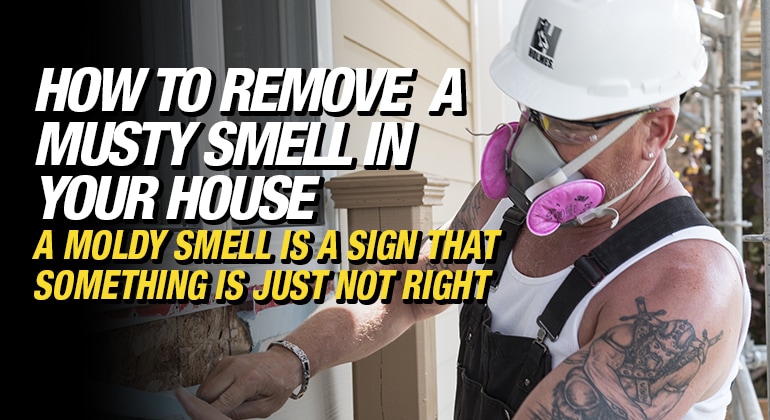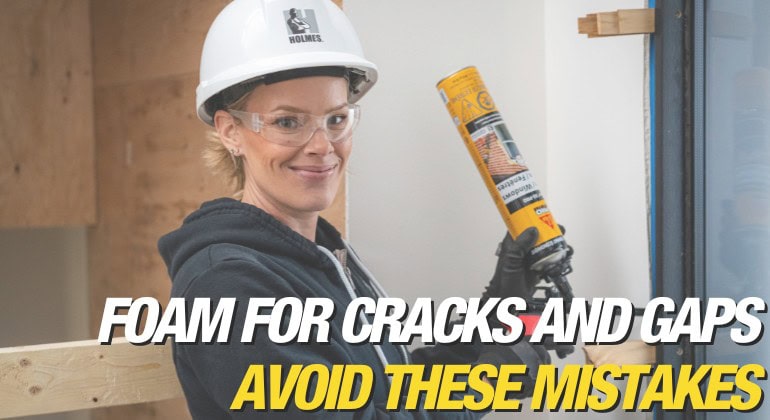Dream of a career where your skills bring joy, enable freedom, and create unforgettable memories? The thriving recreational vehicle (RV) industry offers just that! It’s more than fixing vehicles; it’s...

How To Remove A Musty Smell In Your House
By Mike Holmes
Mike’s Advice / Home Safety & Maintenance
Friday, December 3rd, 2021 @ 3:51pm
I am going to be honest with you. A musty or moldy smell is a sign that something is just not right in your house. Many homeowners tend to open up their windows to get rid of all sorts of smells. The truth is, unless you look into the cause of the damp smell, you will not be able to get rid of it. Here is how to remove the musty smell in your house.
Look For The Source of the Musty Smell
You know I always talk about the WHY not just the HOW. I want you to investigate the source of the musty or damp smell. If you don’t look for the source, you will never get rid of the smell.
What Causes Musty Smells?

Most commonly, the presence of mold will cause a musty smell. Mold in the air outside can also attach itself to clothing, shoes, and pets, and be carried indoors.
Here are some issues the presence of mold can cause:
- allergic reactions
- runny noses and sneezing
- eye and throat irritation
- asthma or more serious illnesses in those with compromised immune systems.
Certain molds can pose major health risks. Mold growing in a home indicates that there is a problem with water or moisture intrusion. This is the first problem I want you to tackle.
No number of open windows or air fresheners will fully remove the smell created by mold. These quick fixes may temporarily mask the scent, but you still need to deal with the issue of mold.
All mold needs to grow is the presence of mold spores, a surface to grow on, warmth, darkness, oxygen, and moisture. The last piece of the puzzle — moisture — is the biggest issue.
How Do I Test For Mold In My House?
The first thing I want you to do is to take your flashlight and inspect areas that collect moisture. Don’t forget to check corners and tight spaces that don’t get much airflow.
Mold likes to grow in a dark area. It may not be visible right away.
If you have spotted mold, you should bring in a professional mold remediation company to help get rid of it.
You can also get an indoor air quality test done by a qualified professional, like a home inspector. They can test for Mold Spores in the air you breathe. The sample they collect is sent to a Certified Third Party Laboratory. The lab report should provide a detailed written report of the quantity and type of spores.
Home inspectors can also use an Infrared Thermal Imaging camera and a Moisture Meter to determine if there’s any water damage between the walls, floors and ceilings. Water damage can cause mold growth.
RELATED
Does A Musty Smell Always Mean Mold?
Not always. A stale odor can also occur if you haven’t cleaned your ducts in a long time. If you have damp clothes in your closet, that can also create a musty smell.
Leaks Can Cause A Musty Smell
You can have issues with mould after a small leak from a variety of sources. It could be from your water heater or plumbing, or rain coming in a basement window.
Check for areas of moisture behind toilets and beneath your sink. Even a small leak can create a nasty musty smell, not to mention wasted water.
If the base of your vanity cabinet looks damp or warped, you might have a leak in the plumbing or a clog that is causing a leak.
RELATED
Is Your Foundation Leaking?
Check your foundation for cracks. If you find a big crack, you should be concerned about water getting into your house. We want to make sure water stays away from the foundation. If your basement has a leak, it needs to be addressed.
If your crawl space is wet, you have sagging floors or cracks in your basement walls, you could potentially have a foundation issue.
Here is a tip from me. If you notice a crack in your foundation, mark it with tape. Now check back in a few months. If the cracks aren’t growing, they can usually be filled with an epoxy injection or expandable foam.
If you can fit a coin in any of the cracks, it’s time to waterproof from the outside. Here is how you do repair a leaky foundation.
RELATED:
Check Your Laundry Room for Leaks
Walk to your laundry room. Check for leaks around the washer and around the doors of front-load washers. Make sure that your dryer vent is clean and that the outdoor vent is not blocked. Good airflow is important to eliminate moisture.
Check Your Basement Windows
Is water being diverted away from your windows properly? Or are you seeing it pool around them? If your windows are wet — or weeping, it indicates that you’ve got a moisture problem with your home.
Inspect around your windows searching for signs of mildew, bubbling paint, or small amounts of water pooled in the window pan.
If you’re doing renovations in your basement and planning to install a larger egress window, you’ll likely have to install part of it below the grade. If you don’t plan for proper water drainage, you’ll see plenty of problems with wet windows.
RELATED
Is Your Grading An Issue?
If you notice water running towards or pooling next to your house’s foundation walls, you likely have some house grading issues. Proper grading is key in ensuring water flows AWAY from the house.
If water is draining towards the house, you could have moisture related issues. This in turn causes a stale or damp smell.
Use A Dehumidifier
Use a dehumidifier during humid months. Mold and mildew need moisture to thrive, so lowering the humidity level in your home can help keep mildew under control. Some HVAC systems also have dehumidifiers as part of the unit. It is important to keep the dehumidifiers clean and the water-catching bins empty for them to work properly.
All dehumidifiers let you pick a basic humidity level—normal, dry, or very dry. But some models have additional features that you might find useful. This includes a timer, digital controls, and a front sensor.
Getting the right balance of moisture in your home can sometimes feel like Goldilocks—it has to be just right.
RELATED
How Can An ERV Help Maintain Indoor Humidity Levels?
If your house isn’t properly ventilated, excess humidity can sneak inside your walls and create mould and structural damage. My top tip for creating an effective air exchange is to install a heat recovery ventilator, or even better, an energy recovery ventilator (ERV).
I recently had the Panasonic Intelli-Balance 100 energy recovery ventilator installed in my crawl space. I’d been planning to put one in for years and finally got around to it when I began remodelling my house. It is Energy Star certified and designed for new airtight homes built to meet energy efficiency standards.
There are lots of benefits to ERVs, including:
- Improving Your Indoor Air Quality
- Improves HVAC Efficiency
- Keep the Moisture Level Consistently Safe
- Is Easy To Maintain
Read More
Change Your Carpet
If your carpet has the presence of mold or mildew, I recommend changing it instead of attempting to clean it. Sometimes pet accidents can also cause a damp smell.
Clean Your Ventilation Systems
Clean your air ventilation systems regularly. Pay attention to your filters and intake systems in your HVAC system and inspect them for any mould growth.
If the air isn’t properly exchanged through good ventilation, you will likely have poor indoor air quality and moisture problems. And moisture leads to mould.
Turn on Ventilation Fans
Always run your exhaust fan when cooking or taking a shower and at least 20-30 minutes after. If you don’t have a ventilation fan, install one. After showering, I also recommend wiping up excess water and drawing the curtain closed so it dries.
TISSUE TEST: If your exhaust fan seems weak, do the tissue test. Turn your exhaust fan on—could be the one in the kitchen or bathroom—and hold a tissue up to it. If the fan holds the tissue it’s probably fine—if not, you might need to replace the fan. If any of your exhausts fail the tissue test bring in an HVAC pro.
Installing A Bathroom Ventilation Fan
I don’t recommend installing a bathroom fan yourself. It is NOT a DIY project. This involves cutting a hole in your roof and electrical work. If this is a new installation, you may have to run electrical wiring and ductwork in your attic.
Here are the basic steps for installing a bathroom fan:
- Cutting the hole in your drywall based on the size of the fan
- Attaching the fan enclosure to the joist with screws
- Cutting a hole in the roof (this also requires removing shingles)
- Installing a roof vent
- Connecting and wiring the fan
- Wiring the switch
RELATED
Check Your Air Conditioning Unit
When you have your AC running, there is a lot of condensation inside the unit. If the moisture isn’t draining properly, it can escape into the ducts. This can cause mould.
I recommend bringing in an HVAC technician. They will have the knowledge to handle the problem and make sure that it doesn’t recur.
Invest In An Air Purifier
Run air purifiers with HEPA filters to remove over 99% of particles in the air. This includes mould spores and tiny dust particles. Some manufacturers have purifiers with specialized filters to remove odours.
I had a Panasonic WhisperAir Repair® – air purifier installed as part of my home upgrades. This is a good unit to have to improve your indoor air quality.

I had 5 of these Panasonic air purifiers installed in my home because I wanted to have the peace of mind I’m breathing fresh, clean air.
By reducing pollen and other allergens, the Panasonic WhisperAir Repair® air purification device helps to maintain healthy indoor air quality (IAQ). They can even break down hazardous substances. Not to mention each device lightly deodorizes materials and eliminates odours in your living area so you never have to deal with bad odours again and can have peace of mind you’re breathing fresh, clean air.
READ MORE:
How Does The Panasonic Air Purifier Work? We Tested it to Find Out!
Test Your Home’s Air Quality
I want you to test your indoor air quality. Some home inspectors offer Indoor Air Quality (IAQ) assessments. During these inspections, a home inspector will go through the entire home and identify potential indoor air quality risks, including moisture issues that can lead to mold.
Professional home inspectors can also take indoor air samples. These are then sent to a certified lab for analysis. They can even give you a mold spore count and send you a report with results.
Check Your Closets
This seems simple, but the musty odor may be coming from damp clothes that you have put away. This is an easy fix!
If your house does have a musty smell, good ventilation and air circulation are important. If you did bring in a mould remediation company, make sure you are taking steps to prevent it from coming back.
READ NEXT













